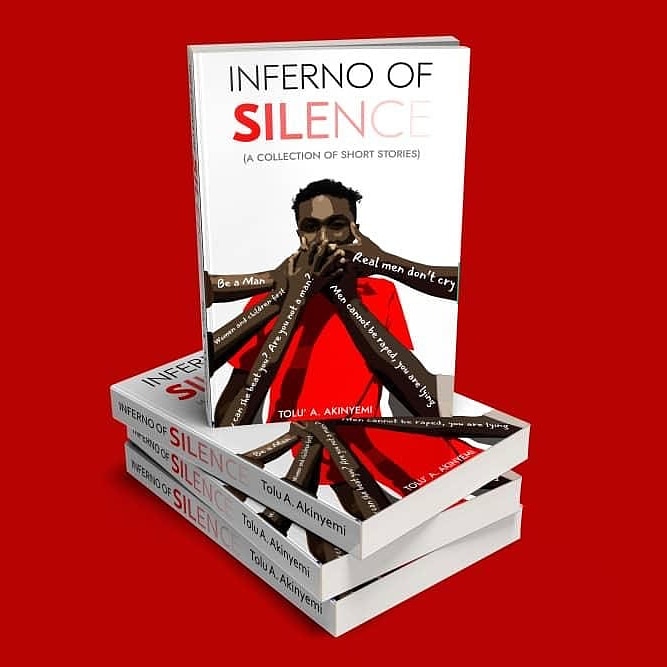By Olukorede Yishau
It is a cold, cold world for women. It is. But, is it an easy world for men? Do they always get what they want on a platter of gold? Do men cry? Or, better still, should men cry?
Those are some of the questions that popped into my head while reading Tolu A. Akinyemi’s collection of short stories ‘Inferno of Silence’.
Other questions that the book may raise include: Can a man be the victim of domestic violence? Can a man be raped? Are there consequences for our past deeds? Can love triumph over political upheavals? Are mental health challenges peculiar to only the white man?
What does feminism really mean? Is feminism all about opposing and fighting men? Have some people confused feminism with extremism?
The collection, which has seven stories, centres around mental health, redemption, wealth, polygamy, marriage and its challenges, racism, and the burdens men bear.
The stories are set in Lagos, Ibadan, Umudike, and Manchester. Through them, the sights, sounds and smells of these places come alive in vivid colours.
In the first story in the collection, ‘Black Lives Matter’, which is told in the first person, the fortune of a footballer plying his trade in a club in Ibadan goes south and he leaves for Europe to play in the league. He soon finds out that being black and playing in the European league comes at a huge price. He resolves to fight racism.
The second story, ‘In the Trap of Seers’, is about a mother and daughter. The mother believes in seers and patronises them as though they are the oxygen she needs to survive, and she always drags her daughter along anytime she goes to see these seers. This is a tale about redemption.
The third story, ‘Everybody Don Kolomental’, is about mental health and the levity with which it is treated in the developing world. The main characters in this story, Muftau, Adam and others, deal with mental health issues in a society where such issues are seen as white man’s problems.
The titular story, ‘Inferno of Silence’, is about Kunle, a man who is unlucky in marriage. His sweet angel suddenly turns sour angel not long after they tie the nuptials. He tries to find a way to get things rosy but he is bogged down by societal expectations that men must always be strong even in terrible times. The story sheds light on the challenges men face, their hidden truths and the heavy burdens they have to bear.

The story, ‘Return Journey’, is about a chronic womaniser whose parents’ rejection of his choice of a wife, on religious ground, drives him further down the abyss. Ade, who is a major tech businessman in Manchester, is persuaded to return home to Nigeria to start his business. On his return journey, the pilot of the plane turns out to be a surprise to him and things take a hazy colouration from then on.
‘Trouble in Umudike’ is an unsettling story of love, a story which raises posers: what happens when a girl you have snatched kisses with suddenly becomes your father’s young wife? What should you do if the same girl throws herself at you and asks you to take her virginity, which your father’s sudden business trip prevents him from taking after their wedding? Does hiding of secrets about past misdeed return to haunt us?
The last story in the collection, ‘Blinded by Silence’, is also a love story, a love story with a political bent. A husband’s ties with the president prevent him from speaking truth to power even when the inaction of the president threatens his livelihood. His wife’s attempt to get him to change his way results in an unexpected twist.
All in all, the stories address germane matters. For instance, in ‘Black Lives Matter’, the inability of security agencies to provide adequate security for the people is reflected in the lackadaisical approach of the federal SARS after a robbery incident where, instead of going after the real robbers, they arrest the driver of the bus the robbers attacked. ‘In the Trap of Seers’, he tackles the phony ones who pretend to be seers. The story shows booby-traps laid by these men who claim to have the ears of God.
‘Blinded By Silence’ raises the issue of polygamy and poverty. Why on earth will someone afflicted by woes see taking a new wife as the right thing? And for their fecundity and relevance, stories such as ‘Black Lives Matter’, ‘Trouble in Umudike’, and ‘Return Journey’ among others are bound to resonate long after reading them.
With this collection, Akinyemi succeeds in interlacing and formulating everyday events into readable stories. There is sure a story for everyone in this collection narrated from the first person and the third person points of view.
The author delivers these stories in easy-to-access language and the poet in him rears its head intermittently. He also handles the themes in such a way that he offers an all-encompassing collection. And with the right dosage of suspense and humour, he gets the reader to keep turning the pages until the last.
It is, indeed, a collection that raises questions and does not attempt easy answers. It also leaves us with several messages, one of which is: “Mental health shouldn’t be pushed aside. Everyone has a baggage of problems they tend to, sowing seeds of kindness and love can heal a troubled soul.”
My final take: Men are not robots. They are emotional beings and when they are down, shedding tears is not a bad idea. Crying, at times, is therapeutic. Grief and other sad situations— even happiness— can call for some tears to flow. Those tears that cascade down manly cheeks can help the soul, the spirit and the body, and bring some relief. So, let the tears flow. Please.
- Yishau is a newspaper columnist and author of ‘In The Name of Our Father’ and ‘Vaults of Secrets’.